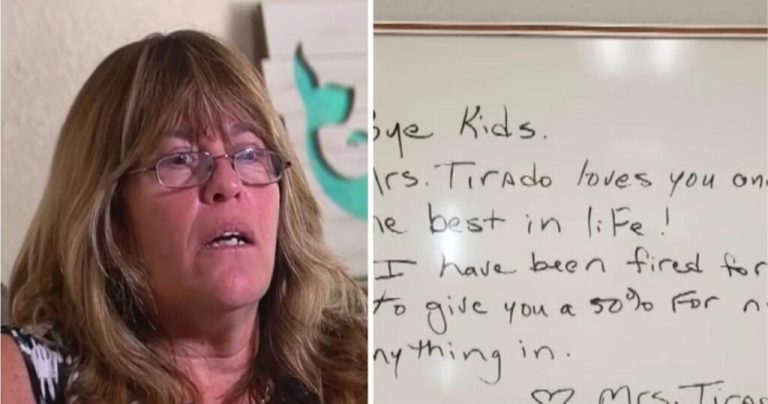Mrs. Tirado, a dedicated educator at West Gate K-8 School in Port St. Lucie, Florida, was known for her high expectations and commitment to helping students succeed. She believed in fostering responsibility and academic rigor, encouraging students to give their best effort in every task. However, her dedication to these principles eventually led to her dismissal after an incident that brought into question the school’s controversial grading policy.
The conflict began last fall when Mrs. Tirado assigned her class a project – a notebook that chronicled various explorers. The students had two weeks to complete it, but many of them failed to meet the deadline. In response, she assigned zeroes to those who did not turn in the work. It was a move she felt was fair, reflecting their lack of effort. But it wasn’t in line with the school’s grading policy.
According to the school’s handbook, teachers were not allowed to give a grade lower than 50%, even if the student didn’t submit the assignment at all. This “no-zero” policy was intended to prevent students from falling too far behind due to a single failure. But to Mrs. Tirado, this policy didn’t promote responsibility; instead, it encouraged students to think they could skate by with minimal or no effort. She refused to comply, and as a result, the administration terminated her position at the school.
The no-zero policy, while common in some schools, has sparked debates across the educational community. Proponents argue that it helps struggling students maintain hope and motivation, preventing them from giving up when faced with academic challenges. Critics, like Mrs. Tirado, contend that it rewards laziness and doesn’t prepare students for the realities of life. After all, in the real world, there are rarely “participation points” just for showing up.
Mrs. Tirado believed that students should learn the consequences of their actions early on. “Life doesn’t give you 50% for doing nothing,” she argued, echoing sentiments shared by many parents and educators frustrated with what they see as a trend of lowering standards. According to her, the policy sends the wrong message – that it’s acceptable to underperform or skip tasks without serious repercussions.
Her dismissal came as a shock to many, but the school remained firm in its decision. Yet, Mrs. Tirado wasn’t going to leave quietly. On her last day, as she packed up her classroom, she felt compelled to leave one final message for her students. Scribbled on the classroom whiteboard, her words were simple yet powerful: “Bye kids. Mrs. Tirado loves you and wishes you the best in life. I have been fired for refusing to give you a 50% for not handing in anything.”
She captured a photo of the message and shared it with her students via a class messaging app. The message quickly gained attention, sparking widespread discussions among parents, students, and educators. Many parents expressed support for Mrs. Tirado’s decision, praising her for upholding academic integrity. Some felt that she was standing up for something bigger than just one assignment – she was fighting for the value of hard work and effort.
On social media, her message resonated far beyond her classroom. Many people shared their own frustrations with lenient academic policies, saying that they contributed to a culture of mediocrity. Others pointed out that in the working world, there are no “participation grades,” and people are held accountable for their responsibilities. The idea that students should be held to the same standard was met with widespread agreement.
Despite the controversy, the school district defended its policy, stating that it was designed to support students who might be struggling with issues outside of their control, such as difficult home environments or learning disabilities. By ensuring that students never receive a grade lower than 50%, they hoped to give everyone a fair chance to succeed. But many, like Mrs. Tirado, believe that this approach does more harm than good, creating a generation of students who are unprepared for the demands of the real world.
The story of Mrs. Tirado is not an isolated one. Across the country, debates over grading policies, academic expectations, and student accountability continue to surface. As education evolves, schools and educators grapple with how best to balance compassion and academic rigor. Should schools focus on ensuring that students never feel the sting of failure, or should they teach the hard lessons of accountability early on?
For Mrs. Tirado, the answer was clear. She stood by her decision, believing that her students deserved better than lowered expectations. Her message – both on the whiteboard and through her actions – was one of tough love. She wanted her students to succeed, but she also wanted them to understand that success requires effort.
In the end, her story highlights a broader conversation about education and the role of teachers in shaping the future. While policies like the no-zero rule may be well-intentioned, they can sometimes undermine the very goals they aim to achieve. Mrs. Tirado’s bold stand against such a policy may have cost her job, but it sparked an important dialogue about what it truly means to educate and prepare students for life.
Ultimately, the message she left behind serves as a reminder of her commitment to her students – that real success comes not from leniency, but from learning to rise to challenges and putting in the work.

